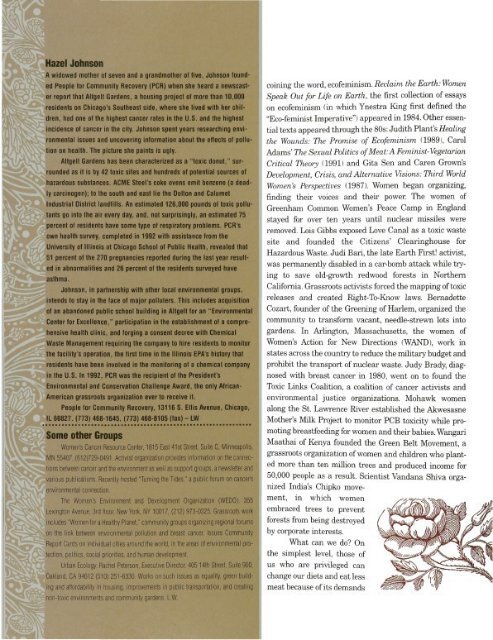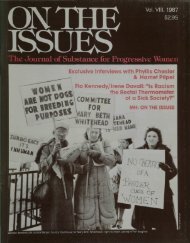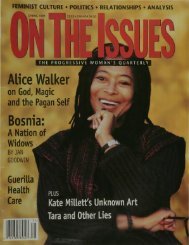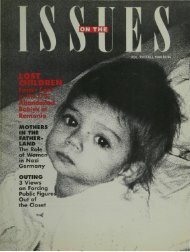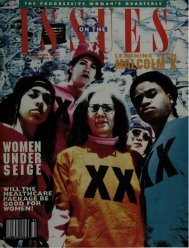women histories, incest sexual abuse. institutionalized. But what if ...
women histories, incest sexual abuse. institutionalized. But what if ...
women histories, incest sexual abuse. institutionalized. But what if ...
You also want an ePaper? Increase the reach of your titles
YUMPU automatically turns print PDFs into web optimized ePapers that Google loves.
Hazel Johnson<br />
A widowed mother of seven and a grandmother of five, Johnson founded<br />
People for Community Recovery (PCR) when she heard a newscaster<br />
report that Altgelt Gardens, a housing project of more than 10,000<br />
residents on Chicago's Southeast side, where she lived with her children,<br />
had one of the highest cancer rates in the U.S. and the highest<br />
incidence of cancer in the city. Johnson spent years researching environmental<br />
issues and uncovering information about the effects of pollution<br />
on health. The picture she paints is ugly.<br />
Altgelt Gardens has been characterized as a "toxic donut," surrounded<br />
as it is by 42 toxic sites and hundreds of potential sources of<br />
hazardous substances. ACME Steel's coke ovens emit benzene (a deadly<br />
carcinogen); to the south and east lie the Dolton and Calumet<br />
Industrial District landfills. An estimated 126,000 pounds of toxic pollutants<br />
go into the air every day, and, not surprisingly, an estimated 75<br />
percent of residents have some type of respiratory problems. PCR's<br />
own health survey, completed in 1992 with assistance from the<br />
University of Illinois at Chicago School of Public Health, revealed that<br />
51 percent of the 270 pregnancies reported during the last year resulted<br />
in abnormalities and 26 percent of the residents surveyed have<br />
asthma.<br />
Johnson, in partnership with other local environmental groups,<br />
intends to stay in the face of major polluters. This includes acquisition<br />
of an abandoned public school building in Altgelt for an "Environmental<br />
Center for Excellence," participation in the establishment of a comprehensive<br />
health clinic, and forging a consent decree with Chemical<br />
Waste Management requiring the company to hire residents to monitor<br />
the facility's operation, the first time in the Illinois EPA's history that<br />
residents have been involved in the monitoring of a chemical company<br />
in the U.S. In 1992, PCR was the recipient of the President's<br />
Environmental and Conservation Challenge Award, the only African-<br />
American grassroots organization ever to receive it.<br />
People for Community Recovery, 13116 S. Ellis Avenue, Chicago,<br />
IL 60827. (773) 468-1645, (773) 468-8105 (fax) - LW<br />
Some other Groups<br />
Women's Cancer Resource Center, 1815 East 41st Street, Suite C, Minneai<br />
MN 55407, (612)729-0491. Activist organization provides information on the connec<br />
tions between cancer and the environment as well as support groups, a newsletter am<br />
various publications. Recently hosted "Turning the Tides," a public forum on cancer's<br />
environmental connection.<br />
The Women's Environment and Development Organization (WED0). 355<br />
Lexington Avenue, 3rd floor, New York, NY 10017, (212) 973-0325. Grassroots work<br />
includes "Women for a Healthy Planet," community groups organizing regional forums<br />
on the link between environmental pollution and breast cancer. Issues Community<br />
Report Cards on individual cities around the world, in the areas of environmental protection,<br />
politics, social priorities, and human development.<br />
Urban Ecology. Rachel Peterson, Executive Director. 40514th Street, Suite 900.<br />
Oakland, CA 94612 (510) 251-6330. Works on such issues as equality, green building<br />
and affordability in housing, improvements in public transportation, and creatini<br />
non-toxic environments and community gardens. L.W.<br />
coining the word, ecofeminism. Reclaim the Earth: Women<br />
Speak Out for L<strong>if</strong>e on Earth, the first collection of essays<br />
on ecofeminism (in which Ynestra King first defined the<br />
"Eco-feminist Imperative") appeared in 1984. Other essen-<br />
tial texts appeared through the 80s: Judith Plant's Healing<br />
the Wounds: The Promise of Ecofeminism (1989), Carol<br />
Adams' The Sexual Politics of Meat: A Feminist-Vegetarian<br />
Critical Theory (1991) and Gita Sen and Caren Grown's<br />
Development, Crisis, and Alternative Visions: Third World<br />
Women's Perspectives (1987). Women began organizing,<br />
finding their voices and their power. The <strong>women</strong> of<br />
Greenham Common Women's Peace Camp in England<br />
stayed for over ten years until nuclear missiles were<br />
removed. Lois Gibbs exposed Love Canal as a toxic waste<br />
site and founded the Citizens' Clearinghouse for<br />
Hazardous Waste. Judi Bari, the late Earth First! activist,<br />
was permanently disabled in a car-bomb attack while try-<br />
ing to save old-growth redwood forests in Northern<br />
Cal<strong>if</strong>ornia. Grassroots activists forced the mapping of toxic<br />
releases and created Right-To-Know laws. Bernadette<br />
Cozart, founder of the Greening of Harlem, organized the<br />
community to transform vacant, needle-strewn lots into<br />
gardens. In Arlington, Massachusetts, the <strong>women</strong> of<br />
Women's Action for New Directions (WAND), work in<br />
states across the country to reduce the military budget and<br />
prohibit the transport of nuclear waste. Judy Brady, diag-<br />
nosed with breast cancer in 1980, went on to found the<br />
Toxic Links Coalition, a coalition of cancer activists and<br />
environmental justice organizations. Mohawk <strong>women</strong><br />
along the St. Lawrence River established the Akwesasne<br />
Mother's Milk Project to monitor PCB toxicity while pro-<br />
moting breastfeeding for <strong>women</strong> and their babies. Wangari<br />
Maathai of Kenya founded the Green Belt Movement, a<br />
grassroots organization of <strong>women</strong> and children who plant-<br />
ed more than ten million trees and produced income for<br />
50,000 people as a result. Scientist Vandana Shiva orga-<br />
nized India's Chipko move-<br />
ment, in which <strong>women</strong><br />
embraced trees to prevent<br />
forests from being destroyed<br />
by corporate interests.<br />
What can we do? On<br />
the simplest level, those of<br />
us who are privileged can<br />
change our diets and eat less<br />
meat because of its demands


